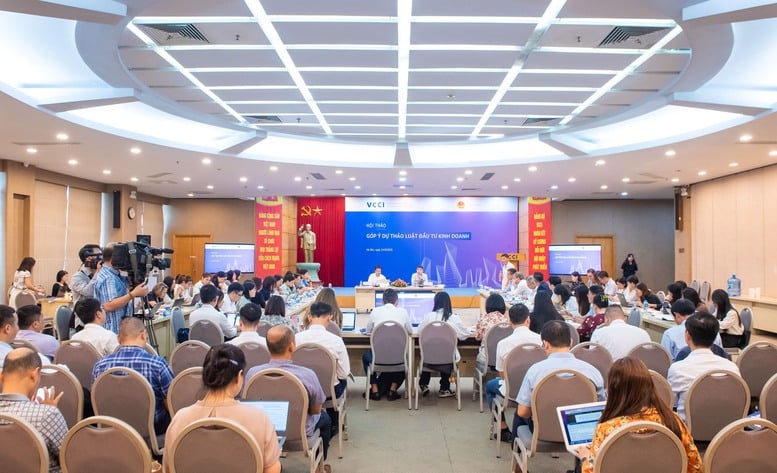
Workshop on providing comments on the Law on Investment and Business jointly organized by the Vietnam Federation of Commerce and Industry (VCCI) and the Ministry of Finance - Photo: VGP/HT
Legal corridor for investment: Driving force for economic growth
Speaking at the workshop on the Law on Investment and Business jointly organized by the Vietnam Chamber of Commerce and Industry (VCCI) and the Ministry of Finance on September 24, Mr. Dau Anh Tuan - Deputy General Secretary, Head of the Legal Department of VCCI emphasized: The role of the legal system on investment in creating a stable business environment cannot be denied. The Investment Law has over the years made an important contribution to promoting private capital flows and FDI, while developing the private economic sector, creating jobs and increasing national competitiveness.
According to Mr. Dau Anh Tuan, the 2020 Investment Law has established an important legal foundation, especially clear regulations on conditional business lines and occupations. The mechanism for controlling the issuance, amendment and supplementation of these business lines has been tightened, thereby ensuring the right to freedom of business. The investment environment is increasingly open, in line with the principle that "people and businesses are allowed to do business in anything not prohibited by law".
However, Mr. Tuan said that the current context has changed dramatically, therefore, the comprehensive revision of the Investment Law - replacing it with a new law called "Law on Investment and Business" - is considered a timely, necessary and strategic step.
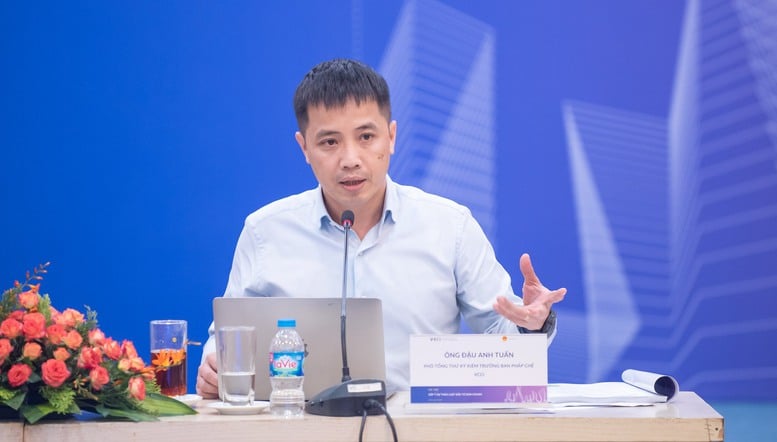
Mr. Dau Anh Tuan - Deputy Secretary General, Head of Legal Department of VCCI - Photo: VGP/HT
Mr. Dau Anh Tuan highly appreciated the proactive streamlining of the law-making process from the beginning, which will help the law structure to be more reasonable, instead of being passively cut. Mr. Tuan also acknowledged the efforts of the drafting agencies in the context of having to balance between legal ideals and practical implementation.
VCCI representative said: This draft Law demonstrates a strong spirit of reform, with many important new points that are highly appreciated by the business community. Specifically, some notable reform contents can be noted such as: Strongly cutting down on conditional business lines and occupations - which are major barriers to business freedom. Simplifying investment policy approval procedures, narrowing down the scope of projects that must be approved; at the same time, strongly decentralizing approval authority. Allowing foreign investors to establish enterprises before having a specific project, ensuring equality with domestic investors. Changing the approach to investment incentives, focusing on high value-added industries, innovation, digital transformation, and sustainable development. Proposing major reforms in overseas investment management, in line with international practices and reality, in the direction of abolishing the Overseas Investment Registration Certificate.
However, besides the positive points, the draft still needs to be improved in many aspects.
Firstly, it is necessary to clarify the boundary of jurisdiction between the Law on Investment and Business and specialized laws such as the Land Law, Construction Law, Housing Law, Real Estate Business Law, Planning Law, etc. to avoid overlap, causing "suspended" projects and wasting resources.
Second, the procedure for approving investment policies is still controversial. Many opinions say that this procedure prolongs the process while the project is already regulated by many other laws. It is necessary to consider maintaining it, and if so, clearly define the scope and subjects of application.
Third, the mechanism for controlling conditional business lines needs to be stricter. In reality, adding business lines to the List is easy, sometimes based on insufficiently convincing policy explanations, causing risks of arbitrariness.
Fourth, regulations on investment incentives need to be linked to actual effectiveness, with clear and easily verifiable conditions, avoiding the situation of preferential movements or failing to assess spillover effects.
Fifth, decentralization and delegation of power must go hand in hand with delegation of responsibility and supervision. Delegating authority to localities is necessary, but implementation capacity and accountability are needed to avoid the situation where everyone acts on their own, causing difficulties for investors.

Mr. Nguyen Anh Tuan - Chairman of the Vietnam Association of Foreign Investors (VAFIE) - Photo: VGP/HT
Association and experts contribute comments to complete the draft
Mr. Nguyen Anh Tuan - Chairman of the Vietnam Association of Foreign Investors (VAFIE) emphasized the need to narrow down the projects subject to investment policy approval.
Mr. Nguyen Anh Tuan said that only large projects with environmental and socio-economic impacts need this procedure. Regarding overseas investment, he affirmed that the issuance of a registration certificate is necessary for investors to have a legal basis to transfer capital and recover profits.
He also agreed with the proposal to allow foreign investors to establish businesses before having specific projects. This is a step in line with the integration context, creating conditions for large corporations to expand their operations in Vietnam.
Mr. Nguyen Noi, former Deputy Director of the Foreign Investment Agency, said that the list of conditional business investment sectors must be regulated by law and cannot be assigned to a decree. This ensures strictness and transparency. He also suggested clarifying regulations on large projects, such as high-speed railways, to avoid missing projects that have a major impact on the budget and society.
Professor Le Dang Hue, former Director of the Department of Civil and Economic Law (Ministry of Justice), warned that the draft lacks core concepts such as "investment policy" or "land use rights". He said that omitting clear definitions would lead to legal gaps, causing difficulties for both management and businesses.
Ms. Nguyen Minh Thao - Head of the Business Environment Department (CIEM) focused on analyzing the list of conditional business lines. Ms. Thao emphasized that instead of just reducing the conditions, it is necessary to reduce the number of business lines. Because, when an industry is included in the list, the risk of creating more sub-conditions is very high. Ms. Thao also said that the criteria for determining conditional business lines are still vague and need to be clearly defined to avoid abuse.
Opinions are unanimous that the ultimate goal of amending the Law on Investment and Business is to improve national competitiveness. Vietnam needs modern, transparent institutions to attract and retain investors, while creating a favorable environment for domestic enterprises.
This draft Law on Investment and Business is expected to open a new phase for Vietnam's business environment. Reforms such as cutting down on conditional business lines, simplifying procedures, and creating more favorable conditions for foreign investors are highly appreciated by the business community. However, experts and representatives of the drafting agency also agree that the law needs to continue to be perfected, specified, and ensure feasibility when applied.
Mr. Minh
Source: https://baochinhphu.vn/doanh-nghiep-ky-vong-su-cai-cach-manh-me-tu-luat-dau-tu-kinh-doanh-102250924163254311.htm















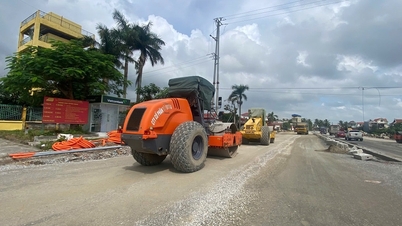









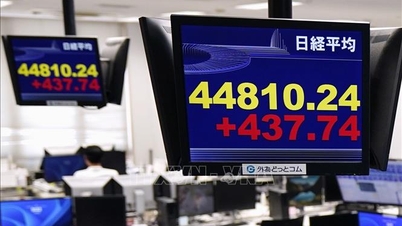






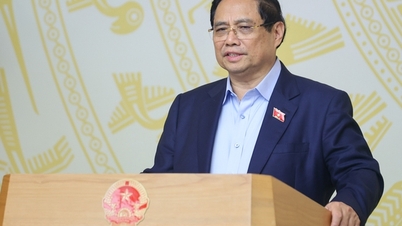



























































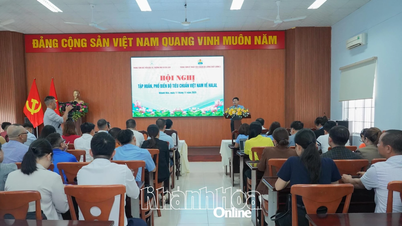







![Dong Nai OCOP transformation: [Article 4] Reaching national standard products](https://vphoto.vietnam.vn/thumb/402x226/vietnam/resource/IMAGE/2025/11/11/1762825820379_4702-cac-san-pham-trai-cay-chung-nhan-ocop-nongnghiep-174649.jpeg)


![Dong Nai OCOP transition: [Article 3] Linking tourism with OCOP product consumption](https://vphoto.vietnam.vn/thumb/402x226/vietnam/resource/IMAGE/2025/11/10/1762739199309_1324-2740-7_n-162543_981.jpeg)







Comment (0)